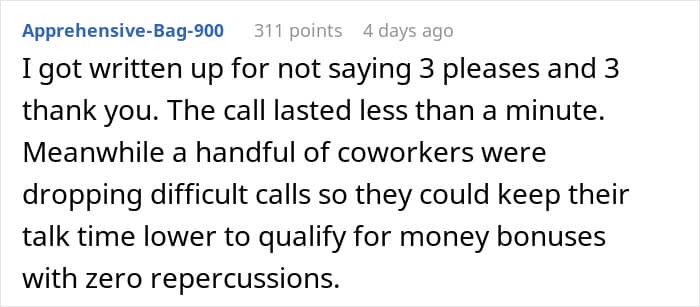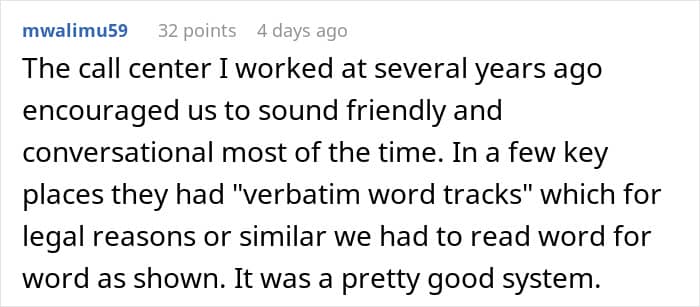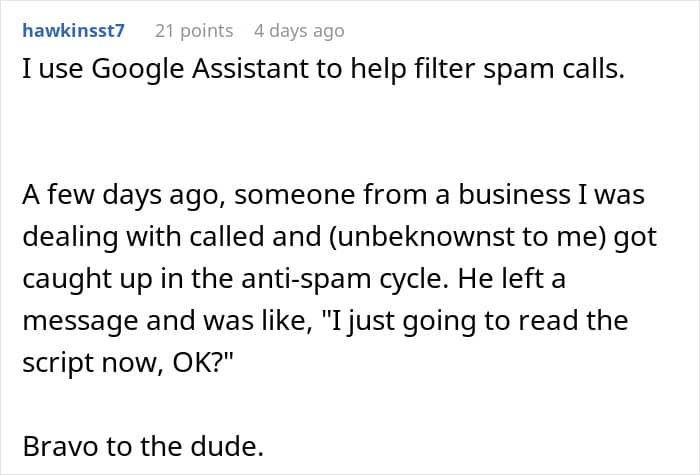Work is a place of rules and regulations, and that’s probably a good thing. What happens when the rules get ridiculous though? There’s probably more than one HR person who’ll tell you they could do without the headaches these silly orders cause.
One call center worker came face-to-face with the problem when her new supervisor got strict about following “the script” to the letter. Rather than argue, she went ahead and followed the boss’s orders, then shared the hilarious results with an online community.
More info: Reddit
RELATED:Some bosses think they always know best, but this employee was quick to prove otherwise

Her new supervisor demanded all call center workers “stick to the script” when dealing with customer queries
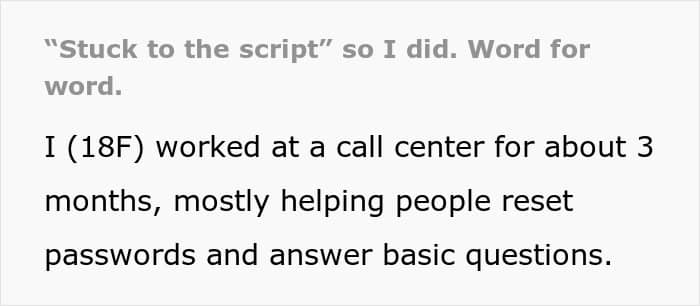



So, the employee followed the new rule to the letter, but customers were less than charmed
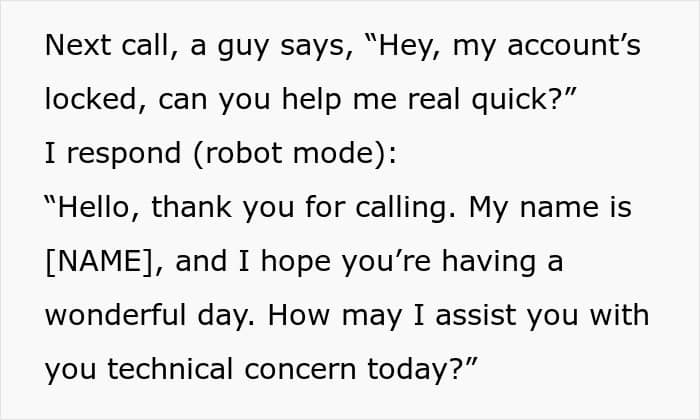



When the new boss stopped by to listen in on one of the employee’s calls, she looked bewildered, before asking her why she was speaking that way


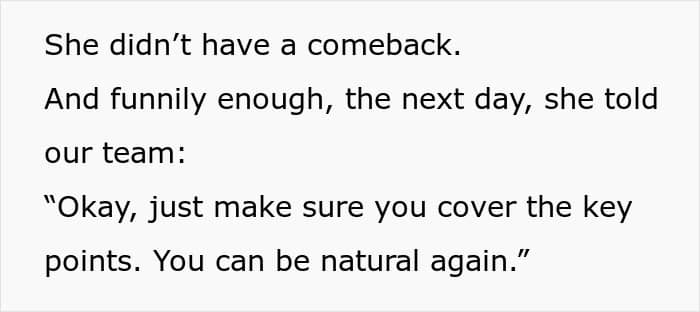
The employee said she was simply following orders, forcing the embarrassed boss to backtrack the very next day
OP got her first taste of the corporate grind while working at a call center. The job? Simple: help people reset passwords and answer basic questions. During training, the vibe was chill; they encouraged her to sound “natural and conversational.” So that’s exactly what she did, and customers loved her for it.
Everything changed, however, when a new supervisor arrived like a storm cloud with a clipboard. Suddenly, going off-script, even a little, was a punishable offense. The message was clear: no more casual chit-chat, no more personality. Just robotic precision, or risk getting written up. So, OP followed orders—to the literal letter.
On her next call, a man asked for help unlocking his account. Her response? A painfully formal monologue straight from the script. “I completely understand how frustrating this unique situation must feel,” she recited with dead-eyed accuracy. The caller was baffled. Her supervisor, overhearing the bizarre exchange, was even more confused.
After the call, the supervisor asked OP why she sounded like a malfunctioning chatbot. The teen simply replied, “You told me to stick to the script.” The next day, the policy magically changed, and everyone was once again allowed to sound like actual humans. A+ for malicious compliance and proving a point with a devastatingly deadpan delivery.

From what OP tells us in her post, she was yet another victim of a superior’s ill-conceived, and strictly enforced, rule. The fact that it backfired proves that her boss is pretty much out of touch with what goes on on the front lines of call centers. So, what can employees do when their supervisors are clueless? We went looking for answers.
According to the World Economic Forum website, some managers are fans of their team questioning their decisions, because they know they’ll never have all the answers. Others? Well, let’s just say they’re less open to questions. If you’re going to bite the bullet and offer upward feedback, tread carefully.
According to Bernard Marr, keynote speaker and leading business and data expert, “Before you lay on the criticism, ask yourself, how important is it that I correct this? If your boss is misquoting your favorite movie, it’s probably best to just let it slide. If, on the other hand, their mistake will be costly to the project or the company, it’s probably worth finding a way to let them know about it.”
The MyCareersFuture website suggests several ways to tactfully disagree with your boss, including keeping it constructive, focusing on the big picture, expressing your views with humility, picking the right time and place, and highlighting the value proposition behind your idea or “selling” it to them.
As it turned out, OP didn’t have to say a word, other than those in her supervisor’s “script.” Perhaps next time her boss will think twice before going against the grain of what’s actually been proven to keep customers smiling.
We reached out to CEO of HR Media & Co. Judith Ojo to ask her how OP might have offered some upward feedback to her new supervisor before the silly rule backfired.
She had this to say, “I believe the employee should have pulled the supervisor aside and said, “I know you’re trying to bring structure, and I appreciate that. From my experience, sticking to this exact script tends to frustrate callers, and we often lose them before we can truly assist. Could we explore some alternate approaches that guide the calls, but feel more natural in conversation?””
According to Ojo, giving honest feedback isn’t about pushing back, it’s about showing care, speaking up early, and sharing what’s happening on the frontlines so leaders can make better, people-first decisions before small issues escalate into big ones.
What would you have done if you’d found yourself in OP’s shoes? Would you have spoken up or let things play out just like she did? Feel free to share your opinion in the comments below!
In the comments, some readers shared their own call center horror stories, while one praised the employee for her classic malicious compliance


